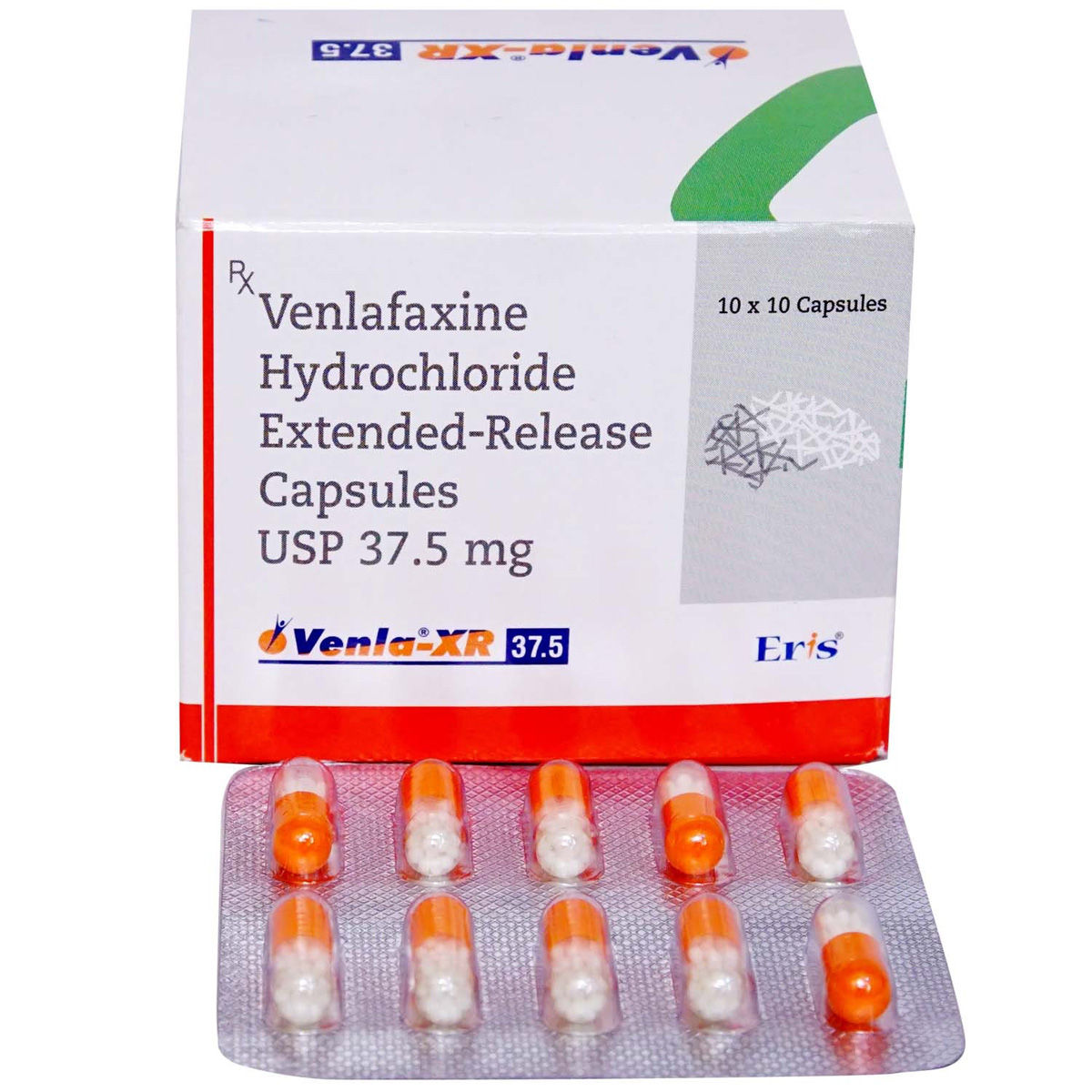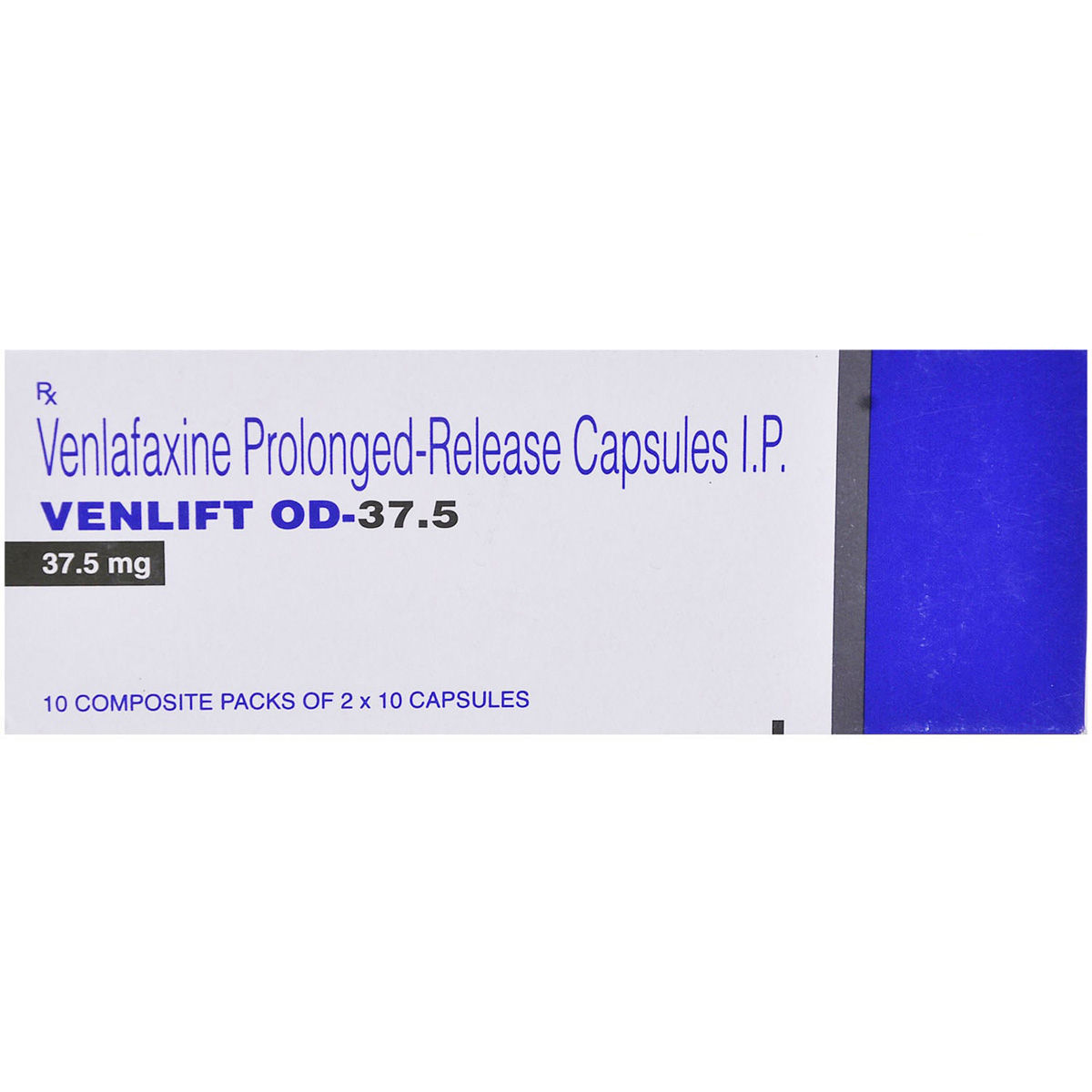Venfax 37.5mg Capsule
Venfax 37.5mg Capsule is used to treat Major Depressive Disorder (MDD), Generalized Anxiety Disorder (GAD), Social Anxiety Disorder (SAD), and Panic Disorder. It contains Venlafaxine, which work by increasing the levels of mood-enhancing chemicals called serotonin and noradrenaline in the brain. It may cause side effects such as nausea, sweating and hot flushes, headaches, dry mouth, dizzy, sleepy, unable to sleep (insomnia) and constipation. Before taking this medicine, you should tell your doctor if you are allergic to any of its components or if you are pregnant/breastfeeding, and about all the medications you are taking and pre-existing medical conditions.
₹17.53*
MRP ₹19.48
10% off
₹16.56*
MRP ₹19.48
15% CB
₹2.92 cashback(15%)
Free Delivery
With Circle membership
(Inclusive of all Taxes)
This offer price is valid on orders above ₹800. Apply coupon PHARMA10/PHARMA18 (excluding restricted items)
Know Your Delivery Time
Provide Delivery Location

Whats That

Secure Payment

India's Most Trusted Pharmacy

Genuine Products
Composition :
Manufacturer/Marketer :
Consume Type :
Return Policy :
About Venfax 37.5mg Capsule
Venfax 37.5mg Capsule belongs to a group of medicines known as 'Antidepressants' It is primarily used to treat Major Depressive Disorder (MDD), Generalized Anxiety Disorder (GAD), Social Anxiety Disorder (SAD), and Panic Disorder. Major depressive disorder, also known as clinical depression, is a mental health disorder characterized by a persistent and intense feeling of sadness for an extended duration of time. Generalized anxiety disorder, or GAD, is a mental illness that makes a person worry more than normal. Social anxiety disorder is a chronic mental health condition that causes extreme fear, anxiety, embarrassment, and self-consciousness in social gatherings. Panic disorder is an anxiety disorder characterized by frequent episodes of panic or fear.
Venfax 37.5mg Capsule contains Venlafaxine belongs to a class of antidepressants known as serotonin and noradrenaline reuptake inhibitors, or SNRIs. These medications are thought to work by increasing the levels of mood-enhancing chemicals called serotonin and noradrenaline in the brain.
Venfax 37.5mg Capsule should be taken as prescribed by the doctor. You may experience feeling sick (nausea), sweating and hot flushes, headaches, a dry mouth, dizzy, sleepy, unable to sleep (insomnia) and constipation. Most of these side effects of Venfax 37.5mg Capsule do not require medical attention and gradually resolve over time. However, if the side effects are persistent, reach out to your doctor.
Before starting Venfax 37.5mg Capsule, please inform your doctor if you are pregnant and breastfeeding or if you have a high level of cholesterol, a low amount of sodium level in the blood, an increased risk of bleeding, suicidal thoughts, liver problems, kidney problems, weight loss, and heart diseases. Avoid driving or operating machinery as Venfax 37.5mg Capsule may cause dizziness, confusion, sleepiness and blurred vision. Venfax 37.5mg Capsule is not recommended for children below 18 years as safety and effectiveness have not been established. Avoid consumption of alcohol while taking Venfax 37.5mg Capsule as it may worsen your symptoms or side effects. Keep your doctor informed about your health condition and medicines to rule out any side effects.
Uses of Venfax 37.5mg Capsule
Medicinal Benefits
Venfax 37.5mg Capsule contains Venlafaxine belongs to a class of antidepressants known as serotonin and noradrenaline reuptake inhibitors, or SNRIs. These medications are thought to work by increasing the levels of mood-enhancing chemicals called serotonin and noradrenaline in the brain.
Side Effects of Venfax 37.5mg Capsule
Feeling sick (nausea)
Sweating and hot flushes
Headaches
A dry mouth
Feeling dizzy
Feeling sleepy
Being unable to sleep (insomnia)
Constipation
Directions for Use
Storage
Drug Warnings
Do not take Venfax 37.5mg Capsule if you are allergic to any of its contents, if you are taking monoamine oxidase inhibitors (MAOI) or have taken them in the last 14 days, or if you are taking antipsychotic medicines. Consult your doctor immediately if you have suicidal thoughts, such as killing or harming yourself. Avoid driving or operating machinery as Venfax 37.5mg Capsule may cause dizziness, confusion, sleepiness and blurred vision. Venfax 37.5mg Capsule is not recommended for children below 18 years as safety and effectiveness have not been established. Avoid consumption of alcohol while taking Venfax 37.5mg Capsule as it may worsen your symptoms or side effects.
Therapeutic Class
Diet & Lifestyle Advise
- Maintaining a healthy diet and exercising regularly helps improve overall health and boost self-esteem.
- Regularly attend therapy sessions.
- Perform meditation and yoga. This helps in relieving stress and provides relaxation.
- Follow a regular sleep pattern to improve the amount and quality of sleep you get.
- Include foods rich in omega fatty acids such as fish, nuts, fresh fruits, vegetables and olive oils.
- Neurotransmitters are made up of amino acids. Amino acid-rich foods such as meat, dairy products, and certain fruits and vegetables help properly maintain neurotransmitters.
- Complex carbohydrates help stimulate Serotonin (a feel-good neurotransmitter). These include whole grains, legumes, spinach, broccoli, oranges and pears.
- Exercising helps in the production of the body’s natural antidepressants. It also relieves stress, improves mood, boosts self-esteem, and provides restful sleep.
- Avoid smoking and alcohol consumption.
- Learn about your condition, understand the risk factors and follow the doctor’s treatment plan.
Habit Forming
How Venfax 37.5mg Capsule Works
What if I have taken an overdose of Venfax 37.5mg Capsule
Alcohol
Unsafe
Taking the drug along with alcohol may increase the side effects such as confusion, drowsiness, and trouble in concentration. A few people may find it difficult in doing mental tasks. A person needs to limit the use of alcohol while being treated with this medicine.
Pregnancy
Caution
Please visit your doctor. There are no competent and well-controlled pregnancy studies. Your doctor will only provide a prescription if the benefits outweigh the risks.
Breast Feeding
Caution
Consult your doctor; there has been no significant research on the use of Venfax 37.5mg Capsule in breastfeeding/nursing moms.
Driving
Unsafe
Venfax 37.5mg Capsule can cause dizziness or may affect a person's ability to drive so one should avoid driving or doing any work that needs clear attention.
Liver
Caution
Inform your doctor before receiving the Venfax 37.5mg Capsule if you have a history of liver diseases/conditions. Your doctor may adjust your dose depending on your current liver conditions.
Kidney
Caution
Inform your doctor before receiving the Venfax 37.5mg Capsule if you have a history of kidney diseases/conditions. Your doctor may adjust yo ur dose depending upon your current kidney conditions.
Children
Caution
The usage of Venfax 37.5mg Capsule is not allowed in children below 18 years old. However, this medicine can be used in children above 18 years after a doctor's recommendation
Country of origin
Author Details
We provide you with authentic, trustworthy and relevant information
FAQs
Disclaimer
Product Substitutes
Reference
- https://www.ciplamed.com/content/venlor-xr-capsules#:~:text=Venlafaxine%20and%20its%20active%20metabolite,alpha1%2Dadrenergic%20receptors%20in%20vitro.
- https://www.drugs.com/venlafaxine.html#:~:text=Venlafaxine%20is%20an%20antidepressant%20belonging,disorder%2C%20anxiety%20and%20panic%20disorder.
- https://www.webmd.com/drugs/2/drug-4870-5047/venlafaxine-oral/venlafaxine-oral/details
- https://medlineplus.gov/druginfo/meds/a694020.html#:~:text=Children%20younger%20than%2018%20years,to%20treat%20a%20child's%20condition.
















